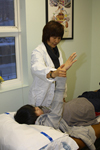Chinese Medicine Philosophy
Traditional Chinese Medicine (TCM) is a complementary medical system developed over the past 3,000 years. It is widely used in China because of its effectiveness without side effects. Recently, the trends indicate a surge of interest in alternative health treatments in developed countries.
Chinese medicine provides a systematic approach for health care. It is based on Yin-Yang philosophy, a relativity theory that reveals the evolving force of both opposing and complementary. For example, in describing the body-function relationship, Yin refers to the biological structures of the human body, and Yang to their functions. By the way, functionally defined organs in TCM cannot be directly equated with the physical organs in western medicine. Yin (body) and Yang (function) should be in harmony with each other to maintain health. Excessive Yang and deficient Yin is the typical state of imbalance. Excessive Yang means that the body is exhausted by over function; deficient Yin means that the body is not strong enough to function properly. In complementary, the body provides bio-energy for function, and normal functional activities keep the body healthy. The available bio-energy for functional activities is called “Qi” (pronounced “chee”) in TCM. The Qi (bio-energy) circulates in the human body through meridians (or channels). The body enjoys good health in a well-balanced Qi system. If the bio-energy circulation is abnormal, the body suffers indicating an illness or disease.
The illness in the bio-energy system could be due to environmental and emotional impacts, improper diet, irregular/abnormal daily activities, trauma, and allergy. When exposed to these conditions, external symptoms may develop. These symptoms are physiological reflections of internal imbalances in the energy system (known as functional organ syndromes). When the body is exposed to unusual environmental changes, it may suffer unrecoverable changes, causing symptoms of violent cold, heat stress, excess moisture, dryness, etc. These are mainly from seasonal or residential climate factors which initially attack the body from the outside. They are called external (environmental) pathogenic factors. When the body suffers abnormal (sudden, violent, or long-term persistent) emotional disturbances, the emotional reactions (anger, anxiety, grief, fear, terror, depression, and overjoy) may be beyond the body’s adaptability. Abnormal emotional impacts cause functional disorders in their related organs. For example, anger hurts the liver, anxiety impairs the spleen, depression overloads the lungs, fear and terror weaken kidneys, and excessive joy unbalances the heart. These functional disorders have a direct impact on organs. They are known as internal (emotional) pathogenic factors.
To balance the bio-energy system, one requires a good understanding of the relationship among the human body, environmental/emotional factors, and food (or medicinal herb) intake. This relationship exhibits intuitive patterns of interaction among five functional groups, symbolically represented as five elements of wood, fire, earth, metal, and water. The interactions are governed by mutually producing and controlling cycles. By following the cyclical interactions, the balance of the bio-energy system can be restored; consequently, the self-healing power in the body is revitalised, which can enable the body to reach its optimum health. In Chinese medicine, methods commonly used to help the body regain the healing power are acupuncture, Chinese herbal medicine, and Chinese medicated diet. These health alternatives can work together to provide maximum healing effect.



